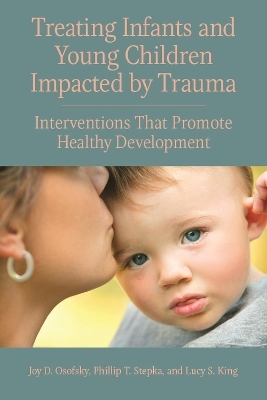
Treating Infants and Young Children Impacted by Trauma
American Psychological Association (Verlag)
978-1-4338-2769-3 (ISBN)
Infants and young children are vulnerable to multiple types of trauma, including neglect and sexual, physical, and emotional abuse. Some believe that young children are not impacted by trauma and that, if they are, they will simply “grow out of it.” Continuing research, however, clearly demonstrates that trauma can alter young children’s neurobiological development and place them at risk for behavioral, social, emotional, linguistic, and cognitive problems across the lifespan. Despite these alarming findings, there is increasing evidence that early interventions can foster recovery and enhance resilience.
Distinguished clinical and developmental psychologist Joy Osofsky and her coauthors distill the vast literature on childhood trauma in this concise guide that reviews what effects these traumatic experiences can have and which treatments are best suited for addressing them. They provide a detailed framework for selecting the most appropriate intervention based on specific criteria. Vivid case examples teach clinicians how to apply these treatments in real scenarios and support parents and caregivers as key attachment figures and sources of security in a child’s life.
Joy D. Osofsky, PhD, the Paul J. Ramsay Chair of Psychiatry and Professor of Pediatrics and Psychiatry at Louisiana State University Health Sciences Center (LSUHSC) in New Orleans is both a clinical and developmental psychologist. She is Director of the LSUHSC Harris Center for Infant Mental Health. Among her scholarly achievements, Dr. Osofsky has written or edited 9 books including the Handbook of Infant Development and Clinical Work withTraumatized Young Children and is co-editor of the WAIMH Handbook of Infant Mental Health. Dr. Osofsky is past president of Zero to Three: National Center for Infants, Toddlers and Families and the World Association for Infant Mental Health. In 2016, she wrote the first chapter on Infant Mental Health in the Handbook of Clinical Psychology. She has played a leadership role in the Gulf Region in developing response and recovery efforts following Hurricane Katrina and the Deepwater Horizon Oil Spill. In 2007, Dr. Osofsky received the Sarah Haley Award for Clinical Excellence for trauma work from the International Society for Traumatic Stress Studies. In 2010, Dr. Osofsky was honored with a Presidential Commendation from the American Psychiatric Association for her work in the aftermath of Hurricane Katrina. Dr. Osofsky was recognized with the Reginald Lourie Award for leadership in the field of infant mental health and outstanding contributions to the health and welfare of children and families in 2014. She does research, intervention, and clinical work with infants, children, and families exposed to community and domestic violence, maltreatment, trauma, and disasters and is the clinical consultant for Safe Babies Court Teams for Zero to Three. Dr. Osofsky is currently Co-Principal Investigator for the Terrorism and Disaster Coalition for Child and Family Resilience, a National Child Traumatic Stress Network Center funding by the Substance Abuse and Mental Health Services Administration. She serves a key role in helping state and national legislators and policy makers understand the behavioral health needs of children, especially young children. Phillip T. Stepka, PsyD, is an Assistant Professor of Clinical Psychiatry at LSUHSC and serves as teaching faculty for the Harris Center for Infant Mental Health at LSUHSC. His interests include trauma throughout the lifespan, child maltreatment, infant mental health, fetal alcohol effects/syndrome, pervasive developmental disorders, sexual abuse and sexual behavior problems, and risk and resiliency factors in military families. Dr. Stepka serves as Project Coordinator for the LSUHSC site for the SAMSHA funded Early Trauma Treatment Network (ETTN), a center in the National Child Traumatic Stress Network (NCTSN). He is a Child-Parent Psychotherapy (CPP) National Trainer and consults on adaptations of other evidence-based practices for young children across the country. Dr. Stepka provides evaluative, therapeutic, and consultation services to military children, their families, and educators at the Belle Chasse Naval Air Station/Joint Reserve Base in South Louisiana. He also collaborates with the military’s Family Advocacy Program (FAP) in developing and implementing resilience-building interventions for young children with deployed caregivers and providing multi-disciplinary treatment to military families impacted by abuse, neglect, and domestic violence. Lucy S. King, BA, is currently a PhD student in the Department of Psychology at Stanford University, where she studies the impact of environmental adversity on psychobiological development from the first months of life through adolescence. Her areas of interest include novel methods for measuring positive and negative aspects of the early environment and the effects of caregiving behavior on the development of stress response systems. She has previously held research positions in the Department of Psychiatry at Boston Children’s Hospital and at Louisiana State University Health Sciences Center. Ms. King has published and presented peer-reviewed research clarifying the associations between caregiving, early stress exposure, and biological reactivity and regulation in infancy and childhood. She has also conducted research on developmental psychopathology in children and adolescents exposed to natural and technological disasters. She is the recipient of a Graduate Research Fellowship from the National Science Foundation.
Series Foreword
Acknowledgments
Introduction: Recognizing the Impact of Trauma Exposure on Young Children
1. The Impact of Early Trauma on Development
2. Child–Parent Psychotherapy
3. Attachment and Biobehavioral Catch-Up Intervention
4. Parent–Child Interaction Therapy
5. Considerations in Choosing a Treatment That Works
Afterword: Conclusions and Future Directions
Appendix: Key Points on the Impact of Early Trauma on Development
References
Index
| Erscheinungsdatum | 02.06.2017 |
|---|---|
| Reihe/Serie | Concise Guides on Trauma Care Series |
| Verlagsort | Washington DC |
| Sprache | englisch |
| Maße | 152 x 229 mm |
| Themenwelt | Geisteswissenschaften ► Psychologie ► Entwicklungspsychologie |
| Geisteswissenschaften ► Psychologie ► Persönlichkeitsstörungen | |
| Sozialwissenschaften ► Soziologie | |
| ISBN-10 | 1-4338-2769-7 / 1433827697 |
| ISBN-13 | 978-1-4338-2769-3 / 9781433827693 |
| Zustand | Neuware |
| Haben Sie eine Frage zum Produkt? |
aus dem Bereich


